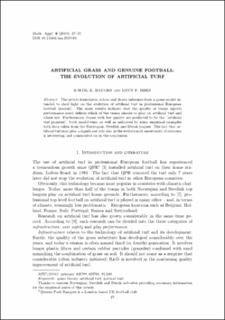| dc.contributor.author | Haugen, Kjetil K. | |
| dc.contributor.author | Heen, Knut Peder | |
| dc.date.accessioned | 2023-10-06T11:57:56Z | |
| dc.date.available | 2023-10-06T11:57:56Z | |
| dc.date.created | 2019-02-13T14:58:52Z | |
| dc.date.issued | 2019 | |
| dc.identifier.citation | Mathematics for applications. 2019, 8 (1), 27-35. | en_US |
| dc.identifier.issn | 1805-3610 | |
| dc.identifier.uri | https://hdl.handle.net/11250/3094965 | |
| dc.description.abstract | The article formulates, solves and draws inference from a game model intended to shed light on the evolution of artificial turf in professional European football (soccer). The main results indicate that quality of teams (sports performance-wise) define which teams choose to play on artificial turf or not. Furthermore, teams with low quality are predicted to be the "artificial turf pioneers", both model-wise, as well as indicated by some empirical examples. The fact that artificial turf may play a significant role also in the evolution of uncertainty of outcome is interesting and is commented on in the conclusion. Keywords: Game theory, artificial turf, natural turf | en_US |
| dc.language.iso | eng | en_US |
| dc.relation.uri | http://doi.org/10.13164/ma.2019.03 | |
| dc.title | Artificial grass and genuine football : the evolution of artificial turf | en_US |
| dc.type | Peer reviewed | en_US |
| dc.type | Journal article | en_US |
| dc.description.version | publishedVersion | en_US |
| dc.source.pagenumber | 27-35 | en_US |
| dc.source.volume | 8 | en_US |
| dc.source.journal | Mathematics for applications | en_US |
| dc.source.issue | 1 | en_US |
| dc.identifier.doi | 10.13164/ma.2019.03 | |
| dc.identifier.cristin | 1677067 | |
| cristin.ispublished | true | |
| cristin.fulltext | original | |
| cristin.qualitycode | 1 | |
